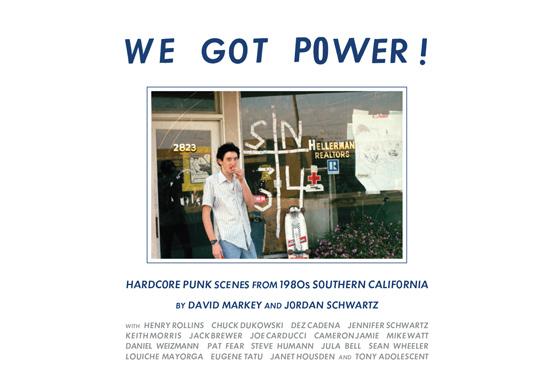Description
DIMENSIONS: 12 x 9 Inches
FORMAT: Hardcover
AUTHOR(S): Jordan Schwartz, Dave Markey
“The Black Flag bus rolled out to the San Fernando Valley to hear Minor Threat play. Jordan Schwartz was there, looking like a reporter straight out of some ’30s movie, wearing a trench coat and a fedora with press pass in the hatband, holding a camera with an old-style flash reflector. It was a pivotal conceptual moment…”—Chuck Dukowski
David Markey was born December 3, 1963, in Burbank, CA. He made his first film at the age of 11 and published a neighborhood newspaper at 12. In 1980, he became involved in the local underground music scene. He helped form Sin 34 in 1981, and captured the punk scene in the Super 8 film The Slog Movie. Markey was a part of We Got Power magazine from 1981 to 1983, then kept the name alive through his We Got Power Films. He cowrote and directed Desperate Teenage Lovedolls in 1984. He photographed, edited, cowrote, and directed Lovedolls Superstarin 1986. Also that year, his band Painted Willie toured with Black Flag for six months, a period depicted in his film Reality 86’d. Markey has directed music videos for Meat Puppets, fIREHOSE, Shonen Knife, Mudhoney, and Pat Smear, and collaborated with visual artists Cameron Jamie, Raymond Pettibon, and Kim Gordon.
Jordan Schwartz met David Markey while skateboarding in a flooded Santa Monica parking garage in 1979. As they discovered the growing Los Angeles hardcore punk rock scene, Jordan teamed up with David, his sister, Jennifer, and Alan Gilbert to found We Got Power magazine. Jordan contributed in many roles, including that of staff photographer. Jordan had producing and acting roles in Desperate Teenage Lovedolls and the sequel, Lovedolls Superstar, notably appearing as the rock star Brews Springstein. Jordan facilitated the release of three Black Flag skateboards featuring original artwork by Raymond Pettibon. In 1984, Jordan began working and living at SST Records’ Global Network Agency booking gigs and tours for various high-profile bands on and off of the label during the pioneering years of the U.S. independent scene.

